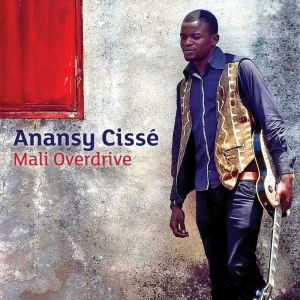Anansy Cissé is one of Bamako’s hottest young guitar talents. So we’re very happy to be able to give out a free download of “Aïgouna,” one of the highlights of his new record Mali Overdrive.
Cissé started his career behind the scenes, running a recording studio in Diré, a town in the Timbuktu region of Mali. During the fighting that broke out in the north of Mali in 2012, he was forced to flee like many other musicians, under attack from radical Islamists that opposed musical performance. Since the conflict, Cissé has relocated to Mali’s capital Bamako, where he embraced a more high-profile role, leading a group that has increasingly won worldwide acclaim. Last summer, Cissé won the World Music Network Battle of the Bands for his song “Baala,” the first track on Mali Ovrerdrive. The album includes contributions from Djimé Sissoko on the ngoni, Abdramane Touré on the calabash, and Zoumana Tereta, a soku fiddler who seems to show up everywhere-- from a recent album by Bassekou Kouyaté to a Velvet Underground cover.
Cissé has a firm grasp of Songhai traditional music and cites Ali Farka Touré, Afel Boucoum and Samba Touré as major influences. As the album opener goes on, his distorted guitar sound takes over, moving the track from the traditional into the current day. The rest of the album follows a similar pattern, with Cissé’s heartfelt singing adding a powerful emotional component.
“Aïgouna” stands out musically on Mali Overdrive, as Anansy shows off his production skills, using effects and interweaving instrumentation to construct a slow-building, highly charged melody that creates something truly powerful even without an understanding of the song’s lyrics. The song is a tribute to the Fulani people, one of the major populations in his native Diré. Like much of the rest of the album, the song fuses a deeply rooted connection to Mali’s history and culture with a transcendent modern sound.
Further along, “Sekou Amadou” is a heavy pedal-blasting track named after the 18th century Fulani marabout (saint). It ends with a clip from a speech by Nelson Mandela about “the struggle of the African people.” Cissé has a sense of humor, too, as “Alhamidou” pays tribute to mothers with a slow rolling sound that emulates the movements of a pregnant woman. He continues his message in support of women on “Aye Woma,” which encourages girls to attend school and not be dragged down by men that would do them harm. “Horey” dips into the sound of takamba, the folk dance style drawn from (among other places) the music of Songhai nobility. Finally, the album closes with “Gomni,” a song that calls for peace in his country. With Mali Overdrive, Cissé has established himself as more than just a promising young musician. He has a voice that could inspire young people throughout Mali toward positivity and political awareness. It is an album that is wildly enjoyable, while containing a message well worth listening to.








